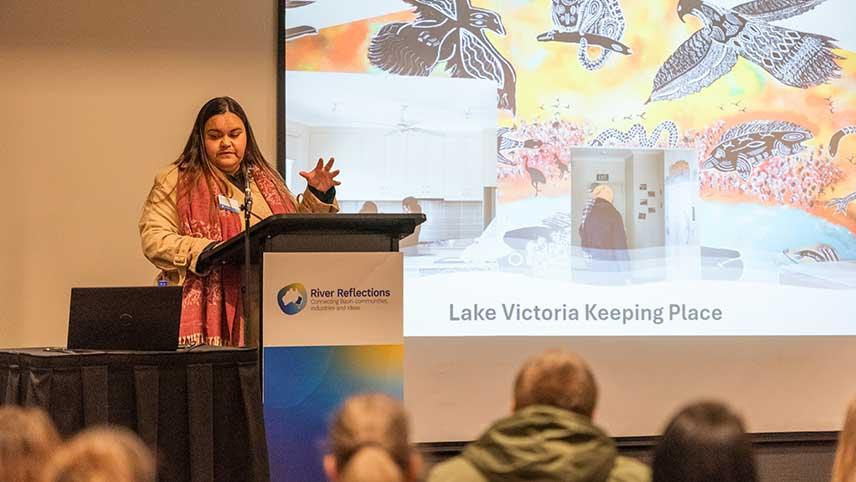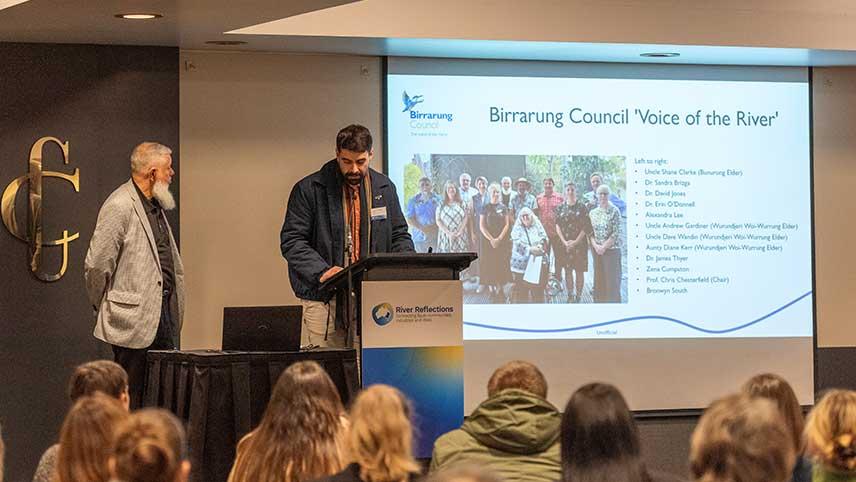River Reflections 2024 was an opportunity for us to hear from a variety of voices across the Basin on how to tackle complex problems and create a sustainable river system for generations to come.
We invited speakers from every corner of the Basin, with diverse levels of experience, interest, and knowledge, to present their findings across 3 key areas: environmental, economical and cultural.
This is what we heard from the First Nations voices that led the Cultural session.
Lake Victoria (Tar-Ru) Aboriginal Heritage Impact Permit: Barkindji Maraura Elders Council – Tamika Smith
Tamika Smith is a Barkindji Woman who is the current acting chair for the Barkindji Maraura Elders Committee (BMEC) at Lake Victoria. The BMEC is made up of Barkindji and Maraura descendants of Lake Victoria (Tar-Ru), and is an avenue for First Nations people to give advice to government agencies on the Cultural heritage management at the Lake.
Tamika’s presentation reflected on the significant history of the site, the journey of collaboration between the Barkindji and Maraura people, neighbouring landholders, and Joint Venture governments, and the development of Lake Victoria’s (Tar-Ru's) Aboriginal Heritage Impact Permit (AHIP).

The AHIP that is in place enables the conservation of the sacred lands and water of Lake Victoria (Tar-Ru) that Tamika spent her childhood learning about.
My family has been involved in the management of Cultural heritage and history at Lake Victoria (Tar-Ru) for 4 generations.
– Tamika Smith
Tamika explained that not only does the AHIP allow for the ongoing use and management of the Lake as a water storage facility, but it also ensures that that damage to Aboriginal heritage from the operation and maintenance of the Lake is prevented.
This wouldn’t have been possible without the continued collaboration and relationship building the MDBA has been fortunate enough to be involved in.
“Together we’ve overcome difficult times – and found a way for us all to understand the importance of science and Cultural connection to the land and people,” said Tamika.
“By sharing our knowledge, we’re showing the next generation how we can work together as a community to solve issues around the lake.”
For more information on the work being undertaken at Lake Victoria (Tar-Ru), watch the session replay.
Rivers as living entities – a foundation for change: Birrarung Council – Uncle Andrew Gardiner and Jackson Chatfield
Jackson Chatfield, Gunditgmara-Kirrac Whurrong man and Executive Officer of the Birrarung Council, was joined by Wurundjeri Woi-wurrung Elder Uncle Andrew Gardiner for the second presentation of the 2024 River Reflections Cultural session.
Together they highlighted the important role of the Birrarung Council as a statutory body created by the Yarra River Protection (Wilip-gin Birrarung murron) Act 2017 (Yarra Protection Act). It provides independent advice to the Victorian Government on the protection and improvement of the Yarra River (Birrarung River).

Not only does the Act recognise the role and leadership of Traditional Owners, and the Wurundjeri Woi-wurrung and Bunurong people as custodians of Birrarung and its lands, but it also “recognises the Birrarung River as a living entity,” explained Jackson.
It’s all about bringing together diverse perspectives, backgrounds, experiences, skills, and differences in opinions to form a collective voice for the river.
– Jackson Chatfield
Jackson and Uncle Andrew’s presentation provided valuable insight into the journey of this collective voice – from the first days of identifying a need for collaboration, to the role that the Burndap Birrarung Burndap Umarkoo: Yarra Strategic Plan now plays in bringing the vision for the future of the river to life.
For more information on the Birrarung Council, watch the session replay.
First Nations perspective on water management in the Murray–Darling Basin (Aqua nullius): Monash University Research Fellow Indigenous water kate harriden
kate harriden is a Wiradjuri woman and research fellow from the Monash University Sustainable Development Institute. Her studies have focused on the investigation of Indigenous science frameworks and methods in storm water and urban water management.
kate’s presentation centered around the term ‘aqua nullius’, and explored how we can challenge the way we think about and approach sustainable water management with First Nations people.
To learn more about the First Nations perspective on water management in the Murray–Darling Basin, watch the session replay.